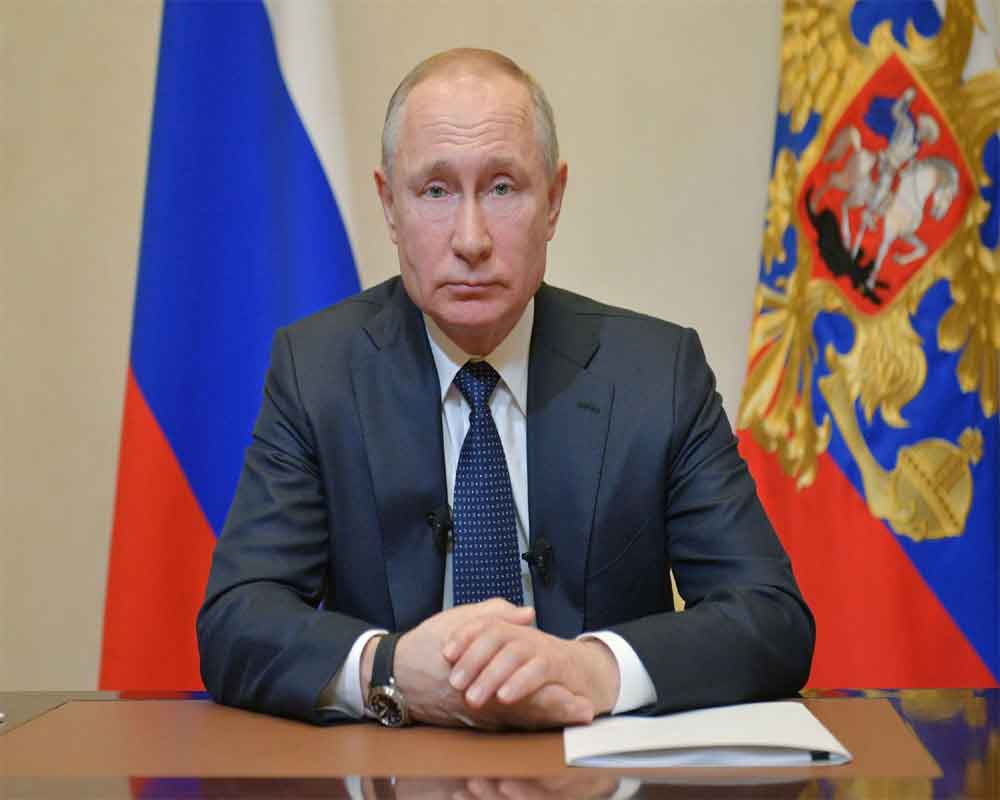A vote on amendments to Russia's constitution that could allow President Vladimir Putin to hold power until 2036 entered its final day Wednesday amid widespread reports of pressure on voters and other irregularities.
For the first time in Russia, polls were open for a week to bolster turnout without increasing crowds casting ballots amid the coronavirus pandemic — a provision that Kremlin critics denounced as an extra tool to manipulate the outcome.
Putin is all but guaranteed to get the result he wants following a massive state propaganda campaign and the opposition's failure to mount a coordinated challenge. Ironically, the plebiscite aimed at consolidating Putin's grip could end up eroding his position because of the unconventional methods used to boost participation and the dubious legal basis for the balloting.
By Wednesday morning, the overall turnout already exceeded 55 per cent, according to election officials, and kept climbing through the day to reach almost 90% of eligible voters in some regions. After polls closed in Russia's Far East, eight time zones ahead of Moscow, officials quickly reported early results showing over 70 per cent of voters backing the changes.
Kremlin critics and independent election observers questioned official figures.
“We look at neighboring regions, and anomalies are obvious — there are regions where the turnout is artificially (boosted), there are regions where it is more or less real,” Grigory Melkonyants, co-chair of the independent election monitoring group Golos, told The Associated Press.
Putin voted at a Moscow polling station, dutifully showing his passport to the election worker. His face was uncovered, unlike most of the other voters who were offered free masks at the entrance The ballot completes a convoluted saga of concealment, deception and surprise that began in January, when Putin first proposed the constitutional changes in a state-of-the-nation address.
He offered to broaden the powers of parliament and redistribute authority among the branches of government, stoking speculation he might continue calling the shots as parliamentary speaker or as chairman of the State Council when his presidential term ends in 2024.
His intentions became clear only hours before a decisive vote in parliament, when legislator Valentina Tereshkova, a Soviet-era cosmonaut who was the first woman in space in 1963, suddenly proposed a measure to let him run two more times.
The amendments, which also emphasise the primacy of Russian law over international norms, outlaw same-sex marriages and mention “a belief in God” as a core value, quickly sailed through the Kremlin-controlled legislature.
Putin, who has been in power for more than two decades — longer than any other Kremlin leader since Soviet dictator Josef Stalin — said he would decide later whether to run again in 2024. He argued that resetting the term count was necessary to keep his lieutenants focused on their work instead of “darting their eyes in search for possible successors.” Gleb Pavlovsky, a political analyst and former Kremlin political consultant, said Putin's unrelenting push to hold the vote despite the fact that Russia is reporting thousands of new coronavirus infections each day reflected his potential vulnerabilities. “Putin lacks confidence in his inner circle and he's worried about the future,” Pavlovsky said. “He wants an irrefutable proof of public support.” Even though the parliament's approval was enough to make it law, the 67-year-old Russian president put his constitutional plan to voters in a bid to showcase his broad support and add a democratic veneer to the changes. But weeks later, the coronavirus pandemic engulfed Russia, forcing Putin to postpone the April 22 plebiscite.
The delay made Putin's campaign blitz lose momentum and left his constitutional reform plan hanging as the damage from the virus mounted and public discontent grew. Plummeting incomes and rising unemployment during the outbreak have dented Putin's approval ratings, which sank to 59%, the lowest level since his ascent to power, according to the Levada Center, Russia's top independent pollster.
Moscow-based political analyst Ekaterina Schulmann said the Kremlin had faced a difficult dilemma: Holding the vote sooner would have brought accusations of jeopardizing public health for political ends, while delaying it raised the risks of defeat. “Holding it in the autumn would have been too risky,” Schulmann said.
Authorities mounted a sweeping effort to persuade teachers, doctors, workers at public sector enterprises and others who are paid by the state to cast ballots. Reports surfaced from many corners of the vast country that managers were coercing people to vote.
The Kremlin has used numerous other tactics to boost turnout and support for the amendments. Prizes ranging from gift certificates to cars and apartments were offered as an encouragement, voters with Russian passports from eastern Ukraine were bused across the border to vote, and two regions with large number of voters — Moscow and Nizhny Novgorod — allowed electronic balloting.
In Moscow, some journalists and activists said they were able to cast their ballots both online and in person in a bid to show the lack of safeguards against manipulations.


























